GCMSsolution - Fonctionnalités
Logiciel de pilotage pour la chromatographie en phase gazeuse et la spectrométrie de masse
Comprehensive range of features for efficiently creating and implementing methods
Automatic Adjustment of Compound Retention Time
AART (Automatic Adjustment of Retention Time)
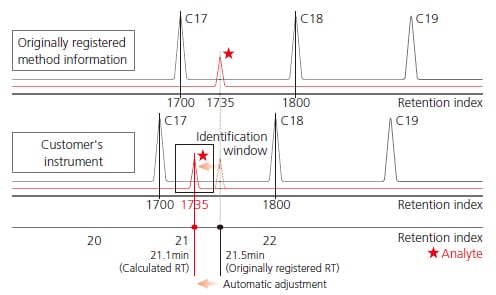
The AART function adjusts the retention times of target components based on linear retention indices (LRI) and the retention times of n-alkanes. The AART function easily adjusts acquisition and processing method parameters simultaneously.

Creation of Automatic Scan/SIM Table
COAST
FASST (Fast Automated Scan/SIM Type) is a data acquisition technique used to perform high-sensitivity measurement while retaining qualitative information of the mass spectrum for the compounds for which enough sensitivity cannot be obtained in scan mode. COAST (Creation of Automatic Scan/SIM Table) automatically creates a method file in FASST mode using measurement data from scan mode. By selecting compounds to be measured in FASST mode, a method file is automatically created and easily transferred for FASST analysis using registered analysis parameters. Fine-tuning of the measurement group time is easily possible by clicking on the chromatogram.
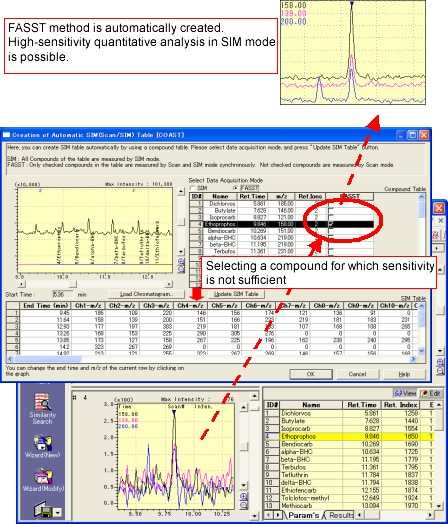
Extensive support for creating MRM methods
Smart MRM makes method development quick and easy.
Whether starting from scratch to optimize transitions and collision energies for new compounds, or starting from an MRM database of known target analytes to build a custom MRM method,
Smart MRM takes the stress an difficulty out of method development.
Compounds and Optimized Transitions -Smart Database-
The Shimadzu "Smart Database" is a database file for creating the method files using "Smart MRM" function. In addition to compound information and transitions, retention index can be registered in the database file. Method creation can be proceeded without calculating the retention time by analyzing the standard samples when using the Automatic Adjustment Retention Time (AART) function. In addition to MRM Smart Database information, Scan and SIM ion information, mass spectra and calibration curve information from the internal standard method can also be registered in the database file. This allows users to create their own database easily.
“Smart Database”

Automatic Method Creation -Smart MRM-
The Smart MRM technology automatically creates methods with measurement times optimized for each component based on the Smart database. The Automatic Adjustment of Retention Time (AART) function incorporated in the system estimates retention times with high accuracy. When creating methods for simultaneous multicomponent analysis, the complicated process of configuring measurement parameters made it difficult to prepare appropriate methods. By using the Smart MRM function, however, it is possible to automatically create methods in which data are acquired with high sensitivity only during the elution time of the target components. In addition to MRM methods, SIM methods can be created.
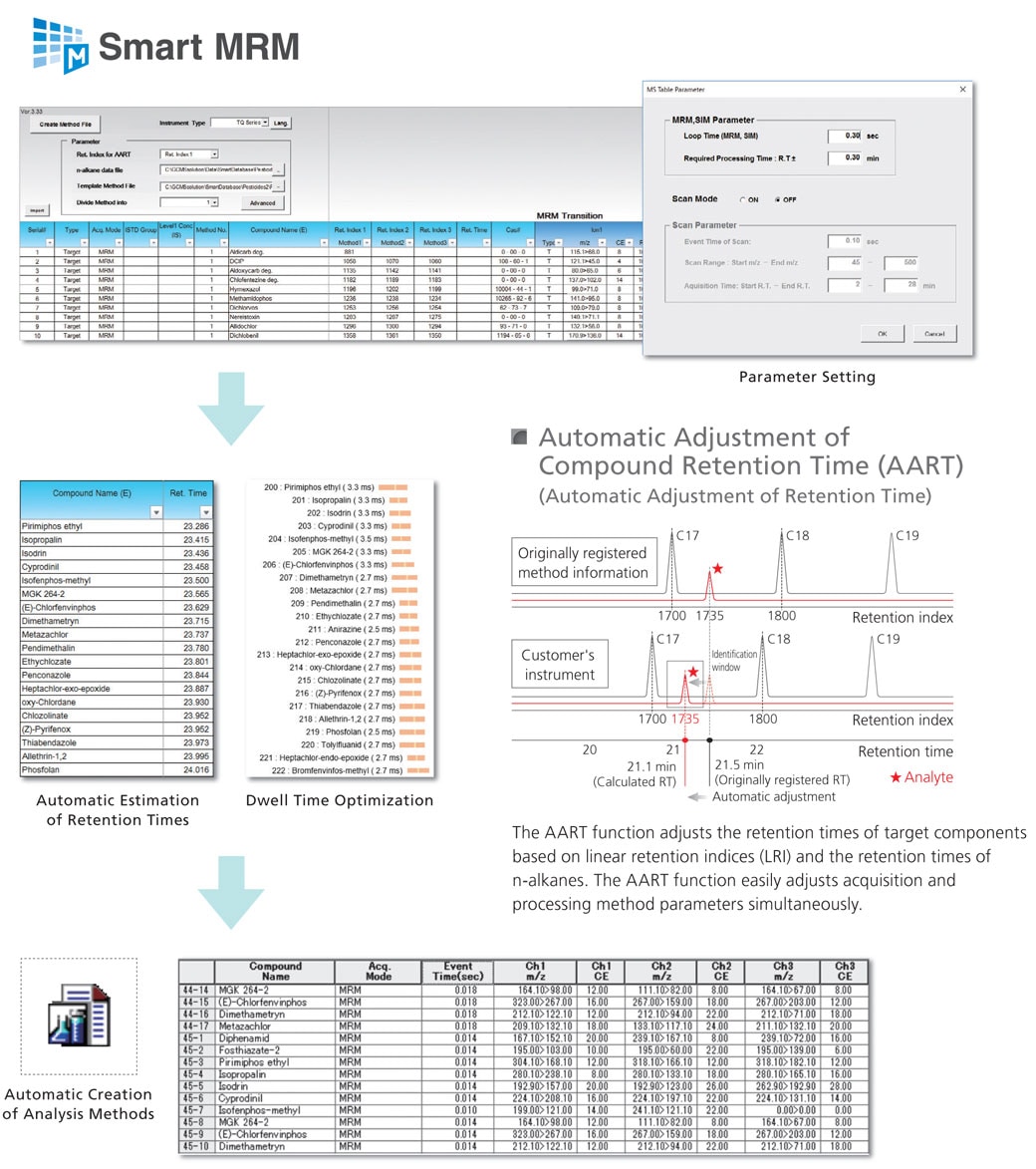
Optimize MRM Transitions Automatically -MRM Optimization Tool-
Determining and optimizing MRM transitions for new compounds can require significant development time.
The "MRM Optimization Tool" automates the process by collecting product ion scan data and finding the optimum collision energy for each transition. Once established, the transitions are registered to one of the Shimadzu “Smart Database” files, and the MRM or Scan/MRM methods are created using Smart MRM.
Makes possible virtually effortless analysis of data
Quantitation Browser
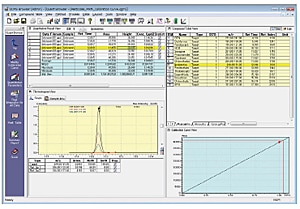
The quantitation browser allows the user to review multiple data sets in the same window. This allows checking the chromatograms and quantitation results from multiple samples with minimal switching between windows.
Supports Accurate Compound Identification
In the analysis of pesticide residues in foods, if the residual level is very low and there is influence from the matrix, peak identification can be difficult. In order to facilitate identification, data from this program can be compared in parallel view with chromatograms obtained at the detection lower limit level and chromatograms of extraction samples with pesticides added. Together, this enables better, easier compound identification. In addition to GC/MS data, data obtained with GC detectors, such as PFDs and ECDs, can also be compared simultaneously.
Similarity Search with Retention Index
Conventional library search, making use of solely spectral similarity, often indicates so many probable candidates for an unknown that it is hard to identify especially in the case that sample includes isomers and much matrix. The GCMSsolution provides "similarity search with retention index", using retention indices registered in the FFNSC GC/MS Library Ver.1.3. This function makes it possible to perform more reliable and easier search even for complex samples. The results can be output as reports in electronic or hardcopy. * The FFNSC GC/MS Library Ver.1.3 can be used for the GCMSsolution Ver 2.4 or higher, or Ver 1.2 su1 or higher. The GCMSsolution Ver 2.4 or higher is required in order to use similarity search with retention index.
Highly Flexible Report Customization
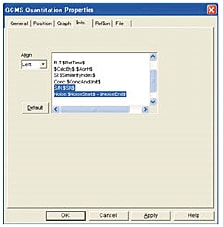
The report format can be edited output into a blank report window sizes. Build your own custom report by choosing from a wide variety of items including chromatograms, spectra, spectrum search results, and quantitative analysis results. Or choose from a selection of template files for quantitative and qualitative analysis, and once a format has been determined, reports of the same format can be created simply by specifying the report file name.
Macros for Reports
Macro functions that facilitate the display of required information on reports make it possible to produce a more diverse range of information. They can be used simply by pasting variables for items of information displayed in the help window into the property dialog boxes of report items.
Supports GLP/GMP
User Management
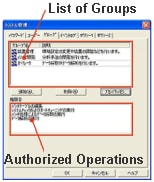
Users are registered by selecting the group to which they are assigned. This group determines what operations are available to that user. Default settings include an instrument administrator, method developer, and operator groups. However, new groups can be created or edited, which allows configuring detailed security measures according to specific administrative requirements.
Various Validation Functions

The Ultra includes software validation and QA/QC functions based on the GC-2010 self-diagnostic and alteration check functions.
Audit Trail
A history of each parameter change and its reasons can be saved check the traceability of analytical results. Also, data files contain a record of the method used to acquire the data, so instruments can be returned to their state immediately after performing an analysis.
Transition from GC-MS to GC-MS/MS is also smooth
GC-MS methods can also be used for GC-MS/MS
Methods created for the QP2020/QP2010 series can also be used with the TQ series. This means that GC-MS/MS analysis can be carried out using existing methods when transitioning from the QP2020/QP2010 series to the TQ series. This results in a great reduction in the number of working hours needed for the transition, since there is no need for redoing the settings for the GC conditions or the analysis parameters. Moreover, equivalent scan spectra can be obtained from the QP2020/QP2010 series and the TQ series, so existing mass spectral libraries can be used for both QP2020/QP2010 series and the TQ series.

MRM methods can easily be created from SIM methods
When you have a SIM method that has already been created, the MRM Optimization Tool is used to search for the optimum transition and collision energy. Since MRM methods can easily be created from accumulated data, transition to GC-MS/MS is quite smooth.
Similarity of software procedures results in lower training costs

Data acquisition and analysis can be carried out within an operating environment that is common to both GC-MS and GC-MS/MS. The operator does not need to learn new procedures, so training costs are reduced.


